Google doesn’t want staff debating politics at work anymore

- Share via
Alphabet Inc.’s Google has posted internal rules that discourage employees from debating politics, a shift away from the internet giant’s famously open culture.
The “community guidelines” tell employees not to have “disruptive” conversations and warn workers that they’ll be held responsible for what they say at the office. Google is also building a tool to let employees flag problematic internal posts and creating a team of moderators to monitor conversations on company chat boards, a spokeswoman said.
“While sharing information and ideas with colleagues helps build community, disrupting the workday to have a raging debate over politics or the latest news story does not,” the policy states. “Our primary responsibility is to do the work we’ve each been hired to do.”
Google has long encouraged employees to question one another and push back against managers when they think the managers are making the wrong decision. Google’s founders point to the open culture as instrumental to the success they’ve had revolutionizing the tech landscape over the last two decades.
But the freewheeling culture has led to a rash of problems for Google management in recent years. Some employees have used internal chat boards to rally other workers against some Google projects, helping push the company to end work on a censored search engine for the Chinese market and an artificial intelligence contract for the U.S. military.
“I think it’s specifically intended to silence dissent,” Irene Knapp, an engineer at Google, said of the new policy. “This is the end of the important parts of Google’s open culture.”
“Ultimately,” Knapp said, “business interests will always win out over ethics in terms of what we’re allowed to say.”
Google employees staged a sit-in to protest what they call a “culture of retaliation” at the company — the latest in a series of demonstrations by tech industry workers.
More to Read
Inside the business of entertainment
The Wide Shot brings you news, analysis and insights on everything from streaming wars to production — and what it all means for the future.
You may occasionally receive promotional content from the Los Angeles Times.











